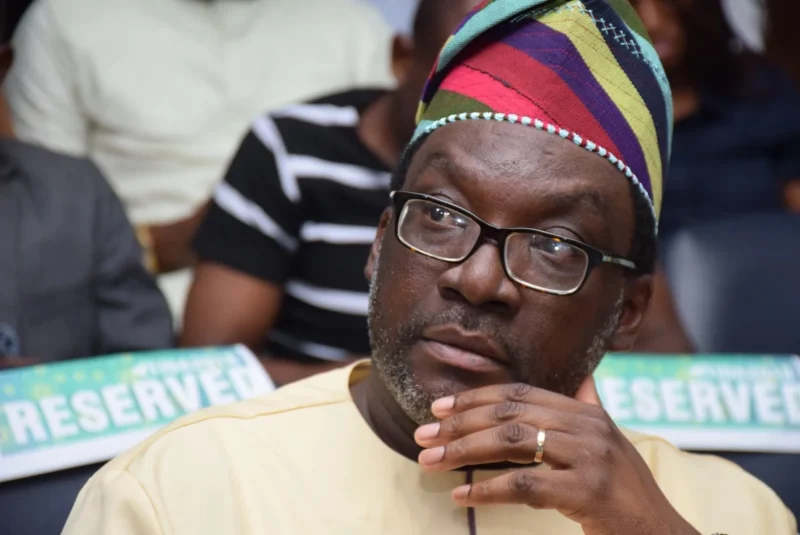Steve Ayorinde, a highly regarded film and art critic, recently shed light on why streaming giants like Netflix are increasingly gravitating towards Nollywood films.
Ayorinde, who previously served as the Lagos State Commissioner for Information and Strategy, made these remarks during the 2024 Africa Movie Academy Awards (AMAA) nominee list unveiling on Wednesday. With years of experience serving on juries for some of the world’s most prestigious film festivals, Ayorinde lauded the AMAA for elevating Nigeria’s filmmakers and positioning them on the global stage.
At 56, Ayorinde remains a prominent voice in the Nigerian film industry, often noted for his astute observations of the film landscape. During the AMAA event, he shared insights into Nollywood’s appeal to international platforms, including Netflix, citing the industry’s “quality storytelling, unique narratives, and artistic and technical expertise” as key factors.
AMAA
Reflecting on the significance of the Africa Movie Academy Awards, Ayorinde credited the event for providing Nigerian filmmakers with a platform that allows them to showcase their talents to the world. “AMAA has given filmmakers confidence and a platform to show themselves to the world that something great is happening here. Anyone nominated in any of the categories now has the world as their playground,” he said.
Ayorinde emphasized the potential for international collaborations that come with an AMAA nomination or win. He highlighted that winning at the AMAA opens doors to major film industries and platforms such as Hollywood, the Cannes Film Festival, Amazon Prime Video, and Netflix. These platforms are actively seeking partnerships and collaborations with African filmmakers, particularly those in Nollywood, who are recognized for their unique voice and creativity.
“Your Hollywood, Cannes Film Festival, and Amazon Prime Video are waiting to see the AMAA winners this year so they can talk business,” he continued. “AMAA gives that platform to expose you to international collaborators. That is probably one of the biggest things you can get.”
Ayorinde’s remarks about why Nollywood is increasingly attracting Netflix’s attention touched on two key factors: the quality of storytelling and the industry’s growing technical sophistication. He argued that Nigerian filmmakers, despite facing challenges, have evolved into global competitors, with stories and productions that rival those from any corner of the world.
“In terms of the technical aspect and the artistic aspect, I think we can compete anywhere, with anyone,” Ayorinde asserted. “But of course, do not confuse that, like in anything in the world, there are politics. There are global politics that may affect people coming from a certain part of the world.”
Nevertheless, Ayorinde made it clear that the artistic and technical quality of Nollywood films is why platforms like Netflix have begun paying closer attention to Nigerian content.
He believes Nollywood is presenting stories that resonate globally while retaining a distinct African essence. “Our films display qualities of the story that we tell, our own stories that we put forward, I think we can compete with anybody which is why your Netflix and other persons are interested in the stories that we are telling,” he explained.
Despite Nollywood’s rise and appeal to international streaming services like Netflix, Ayorinde pointed out that the industry still faces challenges, particularly in global content distribution. He noted that distribution is a significant hurdle that needs to be addressed for Nollywood to truly compete on a global scale.
“Distribution might be a challenge. Which is a totally different scenario as to how our films are marketed,” Ayorinde admitted. He emphasized that while Nollywood has the raw materials, including world-class talent and technical expertise, distribution networks often lag behind.
This challenge, according to Ayorinde, limits the reach of Nigerian films and hinders the ability of Nollywood filmmakers to fully penetrate international markets. However, he remains optimistic about the future, acknowledging that with continued growth and the right investment in distribution channels, Nollywood is on track to cement itself as a global powerhouse in filmmaking.
Ayorinde also highlighted the immense talent present in Nollywood, not only among actors and directors but also within the technical and artistic teams. Many filmmakers and crew members from Nollywood have been trained in some of the best film schools around the world, which, according to Ayorinde, positions them to deliver content that meets international standards.
“The talents that are there, the technical expertise of our people who are trained all over the world in the best schools with the best filmmakers, I think they are ready to take the world. But there will also be a need for improvement,” he said. This blend of local creativity and international training has helped propel Nollywood into the global limelight, and it’s one of the reasons why Netflix and other platforms are keen to collaborate with Nigerian filmmakers.
Why Netflix is Betting on Nollywood
Over the past few years, Netflix has steadily expanded its African catalog, with a particular focus on Nollywood. The platform’s investment in Nigerian content has been significant, with numerous original films and series now available to audiences worldwide.
This growing interest can be traced back to Nollywood’s ability to tell stories that resonate with both local and international audiences, often blending traditional African culture with modern narratives.
The rise of streaming services like Netflix has been a game-changer for the Nigerian film industry, providing a global platform for Nollywood films that would have otherwise been restricted to regional markets. By partnering with local filmmakers, Netflix is not only showcasing the best of Nollywood but also helping to raise the profile of African cinema on the global stage.
The success of titles like The Wedding Party, Lionheart, and King of Boys on Netflix is a testament to the potential Nollywood holds. These films have garnered millions of views and opened up new opportunities for Nigerian filmmakers to collaborate with international production houses.
However, for Nollywood to truly thrive on the world stage, Ayorinde stressed the importance of improving distribution networks and marketing strategies. By addressing these challenges, Nigerian filmmakers can ensure that their films reach a broader audience and gain the international recognition they deserve.










Join our Channel...